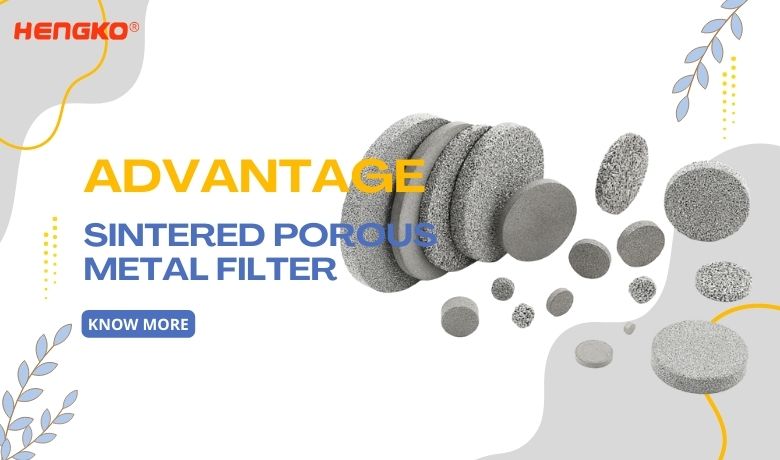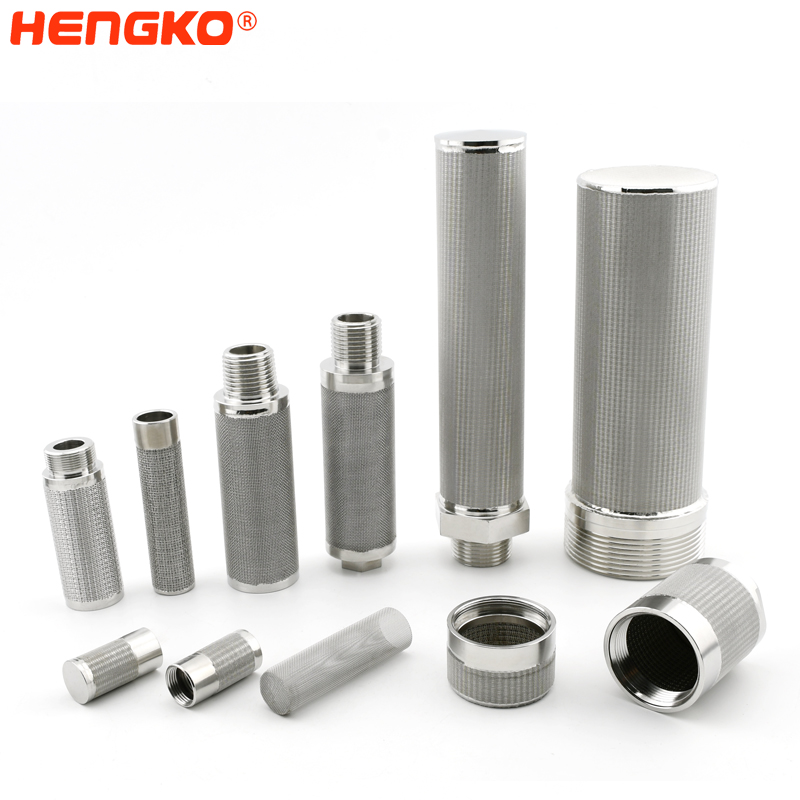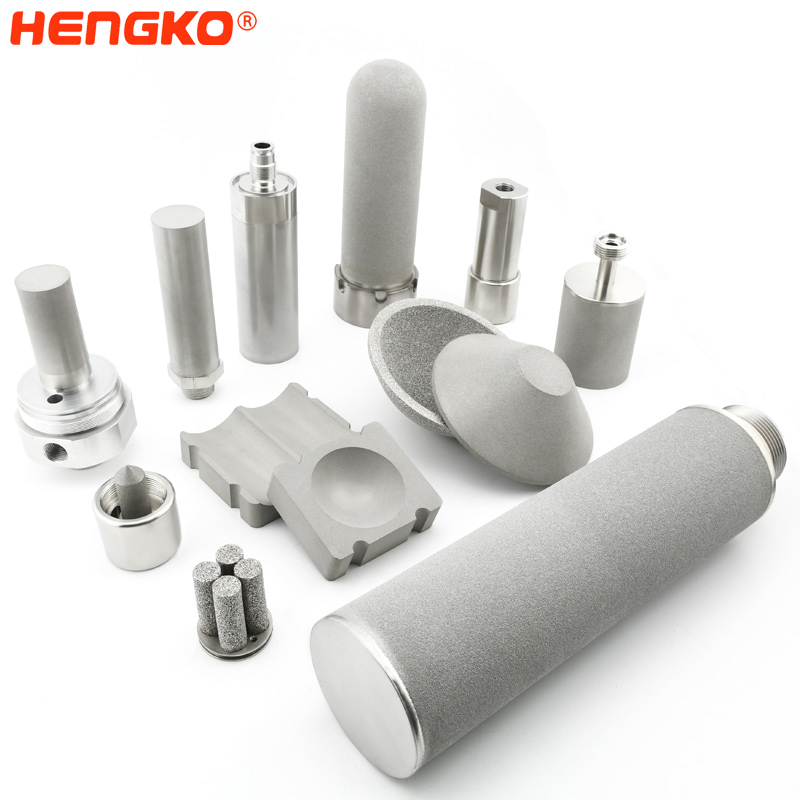
We learn about "how to classification the sintered filter" last week.Today let’s know some advantage of sintered porous metal filter.
First, let us to Check What is Sintered Porous Metal Filter?
Stainless steel sintered mesh is made of stainless steel powder by special laminated pressing and vacuum sintering process, which has high mechanical strength and rigidity. With excellent corrosion and accurate filter precision, sintered wire meshes and sintered filter can be made into various desifilter elements.
HENGKO sintered wire mesh filters have Strong capacity to absorb pollution that have been widely used in environmental protection, petroleum, natural gas, chemical, environmental detection, instrumentation, pharmaceutical equipment and other fields.
You also can choose our powder sintered stainless steel filter if you want more precision filtration. HENGKO powder sintered metal filter element can filter at least 0.2 micron impurities that widely used in various chemical laboratory, pharmaceutical, biological medicine, industrial fine filtration industry.
So What is Advantage of porous metal filters?
There are some important advantages of sintered porous metal filters please check as following :
1. High Durability:
First, Sintered porous metal filters are extremely durable and can withstand high temperatures and pressure differentials and can not deformation or failure .
2. Wide Range of Filtration by OEM :
Sintered porous metal filters can be customized to provide a wide range of filtration capabilities, because it can easy to OEM sepcial filter elements by particle size, flow rate, and chemical compatibility.
3. Long Service Life:
Sintered filters have a lifespan because of their high strength, corrosion resistance, and ability to withstand harsh operating conditions.
4. Cleanability:
Sintered porous metal filters can be easily cleaned and reused multiple times, and also can reduce the need for frequent replacements.
5. High Efficiency Filtration:
Also sintered porous metal filters can provide high filtration efficiency, removing even submicron particles from liquids and gases.
6. Versatility Application :
Porous sintered metal filters can be used in a wide range of applications, including pharmaceuticals, petrochemicals, food and beverage, aerospace, and many others.
Overall, sintered porous metal filters offer a reliable, long-lasting, and versatile solution for a variety of filtration applications.
HENGKO stainless steel filter provides excellent performance for separation of particulate matter from either liquid or gas process streams (i.e., liquid/solids and gas/solid separation) in numerous industrial liquid and gas filtration applications. No matter in extremely high and low temperature experience, HENGKO sintered filter elements will provide you excellent filtration performance.
With more than 20 years of manufactures of sintered stainless steel filter, we have temperature and humidity sensor housing | gas transmitter | module| probe housing and other product for you select. Our professional technique department will give you the technique support and our customer service team will provide you the sales service. Welcome to contact us for further information.
Applications in Various Industries: Deep Dive
Chemical Processing:
In the demanding world of chemical processing, sintered porous metal filters excel due to their:
* Chemical resistance: They can withstand aggressive chemicals like acids, alkalis, and organic solvents, thanks to materials like stainless steel and nickel.
* High-temperature tolerance: They handle extreme temperatures often encountered in chemical reactions, up to 800°C (1472°F) in certain cases.
* Precise filtration: Tailored pore sizes ensure efficient removal of unwanted contaminants like catalysts, precipitates, and suspended solids.
Example: Filtering a corrosive acid solution in a reactor. A sintered bronze filter with a pore size of 10 microns effectively removes catalyst particles while allowing the desired product to pass through. The bronze resists corrosion from the acidic environment, and the high-temperature tolerance ensures the filter functions reliably in the reactor's heated conditions.
Pharmaceutical Applications:
Sintered porous metal filters play a crucial role in the pharmaceutical industry, safeguarding product sterility and purity:
* Sterilization: Filters with fine pore sizes (0.2 microns or smaller) effectively trap bacteria, viruses, and other microorganisms, ensuring product sterility.
* Purification: They remove particulate contaminants like drug crystals, excipients, and filter media from solutions and suspensions, contributing to product purity.
* Biocompatibility: Certain metals like titanium exhibit excellent biocompatibility, making them suitable for filtering biological products like vaccines and blood plasma.
Example: Sterilizing a vaccine solution. A sintered stainless steel filter with a pore size of 0.2 microns removes all bacteria and viruses from the solution while allowing the vaccine itself to pass through. The stainless steel ensures biocompatibility and prevents contamination of the vaccine with metal particles.
Petrochemical Industry:
The harsh environment of the petrochemical industry demands robust filters, and sintered porous metal filters deliver:
* High-temperature and pressure resistance: They withstand the extreme temperatures and pressures encountered in refining processes, up to 500°C (932°F) and 70 MPa (10,152 psi) in some cases.
* Strength and durability: They can handle high flow rates and heavy loads without collapsing or deforming.
* Corrosion resistance: They resist corrosive chemicals like hydrocarbons and sulfur compounds, ensuring long-serviceable life.
Example: Filtering catalyst particles from a hot hydrocarbon stream. A sintered nickel filter with a pore size of 5 microns efficiently removes catalyst fines while allowing the valuable product to pass through. The nickel resists corrosion from the hydrocarbons and the high-temperature tolerance ensures the filter functions reliably in the hot stream.
Food and Beverage Industry:
Sintered porous metal filters contribute to food and beverage safety and quality by:
* Removing contaminants: They filter out impurities like bacteria, yeasts, and other microorganisms, as well as unwanted particles like fibers and metal shavings.
* Clarifying liquids: They remove haze and cloudiness from beverages, improving their appearance and quality.
* Protecting equipment: They prevent wear and tear on downstream equipment by filtering out abrasive particles.
Example: Clarifying fruit juice. A sintered stainless steel filter with a pore size of 10 microns removes pulp fibers and other particles from the juice, resulting in a clear and consistent product. The stainless steel ensures food safety and prevents metal contamination of the juice.
These are just a few examples of how sintered porous metal filters play vital roles in various industries. Their unique combination of strength, durability, and customizable filtration properties makes them an invaluable tool for ensuring product quality, safety, and efficient operation in diverse applications.
why not use other porous sintered materials ?
Sintered Porous Metal Filters vs. Other Filtration Materials: A Comparative Analysis
While sintered porous metal filters excel in many applications, they are not the only filtration game in town. Other materials like ceramics, polymers, and fiberglass each offer distinct advantages and disadvantages. Here's a breakdown:
| Material: | Sintered Porous Metal | Ceramic | Polymer | Fiberglass |
|---|---|---|---|---|
| Strengths: | High strength & durability, High-temperature resistance, Chemical resistance, Reusable & cleanable, Customizable pore sizes | High temperature resistance (some types), Good chemical resistance (some types), High filtration efficiency, Rigid structure | Lightweight, Low cost, Wide range of pore sizes, Good chemical resistance (some types) | Low cost, High dirt holding capacity, Disposable |
| Weaknesses: | High cost, Relatively heavy, Brittle (can crack/fracture), Limited pore size range | Brittle (can crack/fracture), Limited chemical resistance (some types), High manufacturing cost | Low temperature resistance, Poor chemical resistance (some types), Can shed fibers, Not as strong | Low strength, Not reusable, Limited temperature resistance |
| Ideal Applications: | High-pressure & temperature environments, Corrosive chemicals, Pharmaceutical & food processing, Demanding industrial applications | High-temperature gas filtration, Molten metal filtration, Sterile environments | Water filtration, Chemical processing (non-corrosive), Food & beverage processing | Air filtration, Dust collection, Pre-filtration |
When to Choose Sintered Porous Metal Filters:
* High-temperature and high-pressure environments: Their exceptional resistance to heat and pressure makes them ideal for applications like gas turbine engines, chemical reactors, and petrochemical processes.
* Corrosive chemicals: Metals like stainless steel and nickel offer superior resistance to harsh chemicals compared to many polymers and ceramics.
* Demanding industrial applications: Their strength, durability, and reusability make them well-suited for applications with heavy loads, harsh environments, and long lifespans.
* Precise filtration: The ability to precisely control pore size ensures efficient removal of specific contaminants while allowing desired components to pass through.
Why not use other materials?
While other materials have their advantages, they may not be suitable for all applications. For example:
* Ceramics: Although some ceramics offer high-temperature resistance, they can be brittle and susceptible to cracking. Their chemical resistance can also vary depending on the specific type.
* Polymers: They are often limited by their low-temperature resistance and poor chemical resistance to certain solvents and aggressive chemicals. Additionally, some polymers can shed fibers, posing contamination risks in sensitive applications.
* Fiberglass: While cost-effective and good for dust collection, its low strength and limited temperature resistance make it unsuitable for demanding industrial applications.
Then Ultimately, the choice of filtration material depends on the specific requirements of the application.
When high strength, durability, and resistance to extreme temperatures and chemicals are paramount,
sintered porous metal filters stand out as a reliable and versatile option.
Have Any questions and interested to OEM special sintered filters,
you are welcome to contact us by email ka@hengko.com ,
we will supply best advice and solution for your filtration system.
Post time: Oct-27-2021







